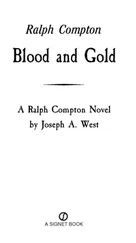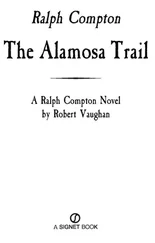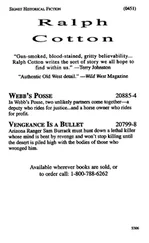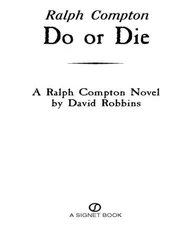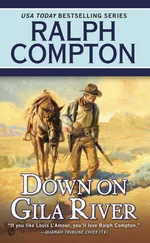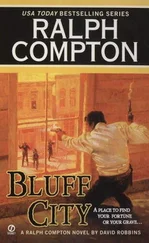Lake shook his head. “It was Apaches. Lifted them horses as nice as you please in the fog.”
“Are you sure?” Pace said.
“Sure of what, Sam? That the horses are gone?”
Annoyed, Pace said, “Hell no. I mean that they were stolen by Apaches.”
“Moccasin sign all over the place. Judging by the tracks, I’d say White Mountain, but I could be wrong.”
His anger growing, Pace said, “An Apache is an Apache. Don’t make a hill o’ beans difference what kind he is.”
“Maybe you’re right, Sam,” Lake said. “When a man’s got his feet to the fire, it don’t matter a damn what kind of Injun’s holding on to his ankles.”
The three fell silent, Pace and Jess having it in their heads that Lake’s news had brought them no pleasure and considerable worry.
“Will they attack us, Mash?” Jess said finally.
“Apaches are notional,” Lake said. “You can never tell what they’ll do from one minute to the next. But I reckon this was a horse raid and they ain’t lookin’ fer a fight, at least not yet and not with us.”
“The army?” Jess said.
“Seems likely enough. They’ve broken out, and they know the horse so’jers will be after them.”
Jess looked at Pace. “Well?”
“Well what?”
“Well, what do we do now, Sammy? Hoof it?”
“We won’t get far on foot. The Peacocks will ride us down and hit us when we least expect it.”
“And the Apaches are painted for war,” Lake said. “Another mighty good reason for staying right where we’re at.”
“You talking about that damned bell tower again?” Pace said.
“Unless you can think of a better place,” Lake said.
“I’m studying on it.”
“Don’t study on it too long, Sam. We’re within spittin’ distance of death right now.”
“The graveyard,” Pace said, as though he’d had a sudden burst of intuition. “Apaches won’t go near a place where folks are buried.”
“Maybe, maybe not,” Lake said. “But the Peacocks will.”
“All right, then, we could just head out of town, hole up in the hills someplace,” Pace said.
“If the Apaches are around, they’d find us fer sure,” Lake said.
“Oh, for God’s sake, you two!” Jess said, her cheekbones flaring red. “The Apaches, the Peacocks, the deacon—they’ll all be here sooner than you think. We’ll hide in the bell tower. It’s our only chance.”
“Like rats,” Pace said.
“Live rats,” Jess said.
“The lady makes sense, Sam,” Lake said. “I think we’ve fresh run out of options.”
“Damn the Apaches, and damn this bad-luck town,” Pace said.
“Now you sound almost sane, boy,” Lake said. “And that’s surely an encouragement to all of us.”
The church had been a hurried afterthought by a few of the more pious residents of Requiem, but it had still not attracted a preacher before the cholera epidemic hit.
It was a rickety timber structure, shoddily and quickly built as the town sought instant respectability.
During its twelve months of existence, it had been pushed into service as a dance hall, a storage place for winter ice and beer barrels, and latterly a makeshift morgue for the cholera dead.
The top of the bell tower was accessed by a ladder that ascended to an open rectangle about four feet wide on all sides. Much of the space was taken up by a rusty iron bell that hung from an oak beam, and a wooden railing, as high as a man’s waist, enclosed the area.
The tower was cramped, smelled of rotten wood, and was known to sway alarmingly in a high wind, but on a clear day it gave a good view of the town and the surrounding area.
But all Pace could see as he moodily stared into the distance was a gray lake of fog that stretched in all directions.
“Make yourselves comfortable,” he said. “We could up be here for quite a spell.”
Lake sounded grumpy. “Hey, suppose I have to take a piss?”
“Over the side, Mash,” Jess said.
“And what about you?” Lake said.
“Over the side.”
“Hell, I’d like to see that.”
“If we’re here long enough, you will,” Jess said.
“We don’t have enough water stored up here for that to be a problem,” Pace said.
Chapter 39
Deacon Santee was lost in the fog, and that annoyed the hell out of him.
But worse, he’d seen the tracks of shod and unshod horses all heading west and that could only mean raiding Apaches making off with their plunder.
His herd and wagons were in that direction. The women he could replace, but the cattle and wagons were too valuable to be taken by thieving Indians.
The deacon was worried. If he didn’t find the damned ghost town soon, he might be forced to return to camp to protect his property.
He had prayed for God to show him the way of course, but the deity must have been preoccupied with weightier matters elsewhere because he was even more lost now than he’d been before.
He led his horse through a thicket of oak and pine, wading into mist so thick he couldn’t see his hand in front of his face.
The sun was up, but did nothing to penetrate the tree canopy, and he stumbled around like a man in a pitch-dark room.
Santee stopped and lit a cigar and stood thinking.
He must be close to the ghost town.
The vaquero had given him directions, but neither of them had accounted for fog. He felt like a lost soul condemned to wander forever in a milk-white hell.
Then he caught the stink.
The rotting dead smell sweet, a cloying stench that immediately assaults the nose and curdles the stomach. It stays with a man. If he comes across a corrupting body before breakfast, its sickening rankness will be his companion at supper.
And a horse is no friend to the dead.
The deacon’s mount tried to back away. It tugged on the reins, head high, white arcs of fright in its eyes.
Santee cursed the animal and dragged it forward through the murk.
He followed his nose.
The corpses lay together, faces blue, postmortem gasses swelling bellies tight against their shirts, threatening to burst and hiss vile foulness into the fog.
The faces of Enoch and Jeptha were almost unrecognizable, but Deacon Santee knew his own.
He did not kneel, or pray (he reserved his prayers only for himself), but he threw back his head and shrieked his anger at a trembling heaven.
He called curses down on the one who had murdered his sons. He demanded of the vengeful God of his own creation that the man’s get be damned until the end of time, seed, breed, and generation.
Even in his more placid moments, Deacon Santee was a cold-blooded, vicious killer. Now, in his blind rage, he was dangerous beyond all measure.
He raised his hands above his head in supplication and demanded that the fog lift.
“There is killing to be done,” he yelled, cigar clamped between his teeth. “All the powers of heaven and hell, disperse ye now this damnable mist.”
The deacon removed his top hat and fetched his back against a tree.
The stench of death in his nostrils . . . he waited.
An hour later, the fog began to lift and gaps appeared in the solid grayness like rips in a curtain.
Below Santee, deep in a shelving valley, the curtain finally parted, revealing a town.
The deacon swung into the saddle and rode down the rise, bringing hell with him.
Chapter 40
After the fog hitched up its skirts and fled, the sun rose in the sky and laid a heavy hand on the wide land.
The day was hot, without a breath of wind, and the deacon sweated under his heavy broadcloth.
He dismounted at the far end of town, tied his horse to the hitch rail outside a barbershop, and looked around.
A single row of gray-faced stores, most of them with false fronts, led the way toward a ramshackle church that had seen better days, a sight that made the deacon cluck in disapproval.
Читать дальше

